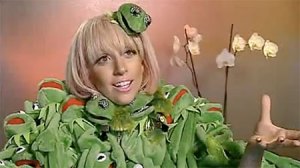
Lady Gaga: who honestly knows what to think? Officially, she's a singer and performer, but she also appears to relish in her role as a sort of professional talking point, a bizarre public figure who generates conversation by arriving at airports dressed in a leotard and outsize sunglasses, and by playing at Glastonbury from inside an enormous box. Once you hear one of her tunes, the damn thing gets wedged in your head for literally
days. ("Can't read my, can't read my, no he can't read my poker face," anybody?) While some people relish having that sort of earworm, others ie. me, find it an infuriating life-ruiner. Debate in the gossip columns about her large hands, muscly legs and ridiculous layers of make-up are rife; and yet La GaGa goes about her business regardless, continuing to do concerts in outfits that are more abstract sculpture than haute couture, and do press conferences in gimp masks without a shred of embarrassment, as though she either doesn't know or doesn't care what anybody thinks of her.
So, Lady Gaga: do we revere her as a modern-day Madonna for the noughties, a fearless performance artist who forces the chattering classes to accept more confrontational modes of female sexuality, or do we think she's a sort of "La Roux for idiots"? (Thankyou,
The Guardian).
Let's weigh up the evidence, should we?
1.
Continually sings about her own vagina."I wanna roll with him, a hard pair we will be, A little gambling is fun when you're with me, Russian Roulette isn't the same without a gun, And baby when it's love if it's not rough it isn't fun... Cos I'm not bluffin' with my muffin, I'm not lying, I'm just stunning with my love-glue gunnin" (Poker Face).
Confident in her own voracious sexuality, knows what she wants in bed and doesn't care who knows it:
Ten points.
2.
Dresses as though she's a living art installation.
Claims: "I dress this way because my whole life is art, and my whole life is performance."
Then that explains get-ups like this:

and this:

Quite frankly, I'm of the opinion that the pop world needs this kind of fearlessness. If it wasn't for crazy bitches like Kate Bush, Bjork, PJ Harvey and Lady Gaga putting a bit of thought and creativity into their wardrobes, the whole world would be full of boring twats dressing like Coldplay, and who wants that? I'll tell you who. Kasabian.
A hundred points.
3.
Might take herself a bit too seriously.
In a recent interview for MTV Malta, GaGa claimed that the gimp mask she was wearing (yes, gimp mask) was "not just a mask, it's a temporary art piece by a designer friend of ours". It's hard to tell whether or not she was joking - on account of the mask covering her face. She went on to talk about her commitment to her work and the life of solitude and her admiration to designers who live a life devoted to fashion. Generally gives the impression that fashion and pop music are
really really important rather than being a bit cheap, transient and throwaway, like Primark. Props to her for having the courage of her convictions, but is she destined for a bit of a body-blow when she becomes a bit 'last year', in the way that all pop phenomena eventually do?
4.
Entire career and persona appear to be an elaborate art prank that went a bit too far.
The evidence is all there. The outrageous persona. The freaky costumes, the explosive stage shows. The way she talks about her work, as though she's daring somebody at the press conference to start laughing and poke holes in it all. The ridiculous self-congratulatory
interview with Paris Hilton that seems too absurd to be true...
...all this, plus the fact that she once upon a time made music that sounds like a
cut-price version of Shania Twain...
...points to her recent career being a bit of a well-conceived and extremely well-planned practical joke, in which Gaga and those around her have cooked up a whole new persona, an arresting wardrobe and 'pop concept' to go with it. Then she can go on telly and to press conferences to talk about her work with a straight face, defying anybody present to be the first to notice that the whole thing is an elaborate hoax.
The pop world needs more of this sort of thing.
Verdict:
Lady GaGa: Hero.








